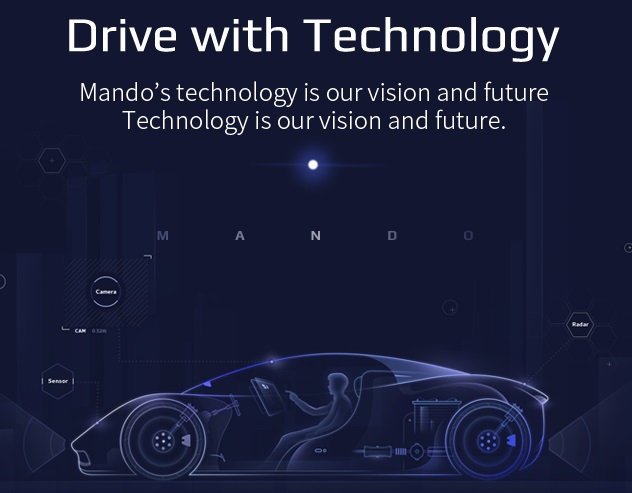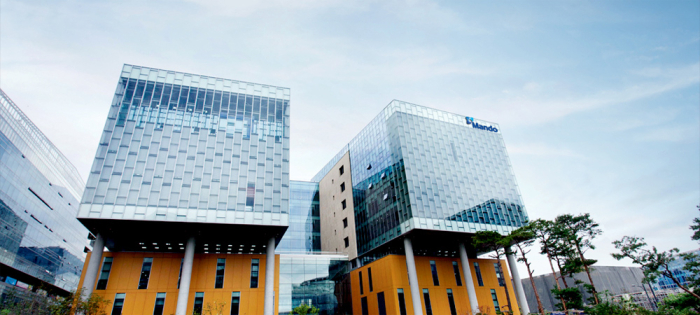Future mobility
Parts maker Mando raises profile as investor in future mobility startups
Analysts say that the company's primary motive is to secure future technologies ahead of financial gains
By Aug 29, 2021 (Gmt+09:00)
3
Min read
Most Read
MBK’s Korea Zinc takeover attempt to spur search for white knights


Korea Zinc, MBK face proxy war for zinc smelter


Korea Zinc shares skyrocket after buybacks in tender offer


Lotte to liquidate rubber JV in Malaysia, sell overseas assets for $1 bn


Samsung to unveil 400-layer bonding vertical NAND for AI servers by 2026



Halla Group’s auto components unit Mando Corp. is rapidly expanding its profile as a startup investor in the future mobility sector.
Mando was among the list of Series A investors of the California-grown automotive software company Sonatus, which raised a total of $35 million this month, along with Kia Corp., LG Electronics Inc. and SAIC Capital. Mando was responsible for 10% of the Series A investment with its funding of $3.5 million.
Sonatus is just one out 19 startups in the automative sector to have received Mando’s investment. Since 2018, the South Korean auto parts maker has been funding early stage startups that specialize in autonomous driving, electric vehicle batteries and vehicle software.
The startups that have received Mando’s funding include both domestic and international companies. DrimAES, a South Korean startup developing Linux-based automotive software raised 2 billion won ($1.7 million) in Series A funding from Mando in June. Silicon Valley’s EV battery technology startup Element Energy received $1 million from Mando in May, also in Series A investing.
“Even without investing significant sums of money, investors like Mando can acquire a substantial stake in early stage startups with valuations that are still relatively low. When these startups become big tech companies, early investors can see immense profit,” said a venture capital expert.
Mando has already made some significant gains as these startups started to be publicly traded either in Korea or the US. MAXST Co., a metaverse company that received 2 billion won ($1.7 million) from Mando in July 2019, was listed on Kosdaq last month. Mando’s MAXST shares are now valued at around 34 billion won ($29.3 million), or 17 times its original investment.
Likewise, Mando’s rate of return from the Chinese autonomous truck driving solutions provider TuSimple is reported to be around 400% after the startup’s Nasdaq IPO in April.
Mando stands out from other Series A investors as it keeps the vast majority of its shares even after the IPO. The company sells only a small fraction of the shares of the startups it invested in that went public, just enough to provide similar amounts of funding to other rising startups.
“Mando only makes investments in startups that aspire to be the leaders of future mobility. In other words, the primary motive of Mando seems to secure future technologies rather than just financial gains,” said an auto industry official.
Mando was the first South Korean auto parts maker to have opened an investment office in Silicon Valley in 2017, under the leadership of the group chairman Chung Mong-won. Mando in 2019 also set up WG Campus, the company’s new department responsible for leading new businesses in the future mobility sector.

The WG campus is located in Pangyo, often referred to as the Silicon Valley of South Korea for housing multiple big tech companies such as Kakao Corp., Naver Corp. and NCSoft Corp. The department is led by Kim Yoon-ki, Mando’s head of startup investment and new business planning, who has deep expertise in the areas of artificial intelligence (AI), mobility services, smart cities as well as future energy. Mando’s Silicon Valley office in the US is headed by Cha Dong-joon, the director of Mando Innovations Silicon Valley.
Write to Jae-Fu Kim at hu@hankyung.com
Daniel Cho edited this article.
More to Read
-
 Hydrogen economyHyundai Oilbank to make hydrogen fuel cell components from 2023
Hydrogen economyHyundai Oilbank to make hydrogen fuel cell components from 2023Aug 26, 2021 (Gmt+09:00)
3 Min read -
 RefineriesHyundai Engineering wins $256 mn order to revamp Thai IRPC refinery
RefineriesHyundai Engineering wins $256 mn order to revamp Thai IRPC refineryAug 26, 2021 (Gmt+09:00)
1 Min read -
 Battery materialsPOSCO Chemical to expand EV battery materials capacity in China
Battery materialsPOSCO Chemical to expand EV battery materials capacity in ChinaAug 25, 2021 (Gmt+09:00)
1 Min read
Comment 0
LOG IN


